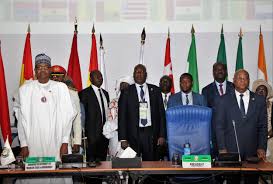By Emeka Alex Duru
Barely three weeks after the August 18 military putsch in Mali, the coup leaders are confronted by the uncertain dynamics of a troubled entity they hijacked. While they rode on the crest of disillusionment that had trailed the administration of President Ibrahim Boubacar Keïta, and Prime Minister Boubou Cissé to seize power, it is increasingly becoming clearer to them that the task in repositioning Mali, is not light.
They for instance, have the alienation of other Economic Community of West African States (ECOWAS) and governments to contend with. By the coup, the soldiers in Mali had breached the ECOWAS and African Union (AU) protocols on change of power which frown against military take-over. They are therefore at the risk of economic and diplomatic sanctions from the continental and sub-regional bodies.
Within hours of taking control, the junta had pledged to unfold a political transition and stage elections within a “reasonable time”. Chief envoy of ECOWAS, President Goodluck Jonathan, was emphatic that the coup leaders wanted a three-year transition period. This was rejected by the 15-nation sub-regional bloc, which has demanded an immediate civilian transition and elections within 12 months.
Mali, is thus in a crossroads. Already disoriented by acute poverty and debilitating insurgency that has eaten deep into substantial part of the country, the county is obviously in huge stress. Added to a possible regime of sanctions from the ECOWAS, its travails will certainly assume wider dimension. The Institute for Security Studies (ISS), a leading think tank in sub-Saharan Africa, captures the situation succinctly. “Mali has entered a period of political uncertainty. The transition arrangements must be carefully negotiated to preserve some stability in the frail security apparatus that’s been fighting violent extremism,” the ISS warned.
This is a matter that calls for reflection by other leaders in the sub-region. What is required in Mali is a careful negotiation to ease the soldiers out of the political scene. Experiences in other African countries where the army had forced its way to power, do not offer excitement or indicate anything particularly different from the Malian coup leaders. Aside the glamour of office and its perquisites, the men in Bamako may not do much in repositioning the country. Their path to power had the trappings of previous experiences in Nigeria, Sierra Leone, Guinea, Cote d’Ivoire, Ghana, Chad, Liberia and other African countries they had set their feet on. All the countries in the continent that have had the history of military incursion in body politics, still bear the brunt of that intervention in many forms ranging from psychological disorder or culture of impunity in governance. Some had even led their countries to civil wars or deeper economic mess.
Like Liberia, like Mali?
That of Liberia and what the soldiers left of the country, particularly remains instructive. On April 12, 1980, when Samuel Doe, a Master-Sargent, took over the reins of power in Liberia, he and his colleagues were celebrated as patriots. Events later proved that the excitement that trailed their putsch was obviously borne of naivety and had nothing to do with the real situation in Liberia. In fact, the endorsement they enjoyed was rather in support of the coup that was then the fad in many African countries.
The reasons offered for the putsch and some of the actions by the new men in power, also portrayed them as messiahs. The usurper regime had accused the civilian administration of William Tolbert which it overthrew, of monumental corruption and holding down the future of the country.
And in what seemed the best of intentions, Doe and his men, promptly embarked on what seemed moral and economic rebirth in Liberia. Part of the actions in this regard, was the arrest of officials of the ousted administration and retrieval of alleged looted state funds from them.
While Doe rode on the cleansing mission, he was lionized. With time however, he was seized by sycophantic members of the ruling class. In the process, he got carried away and over time, became more corrupt than the members of the Tolbert government that he booted out.
To ensure that nobody pried into his activities, he resorted to repression, applying state apparatus to silence real and perceived opponents. Liberians began to take notice of the massive drift by Doe, when he started turning his sword against his former comrades-in-arm. The state of anarchy became more pronounced when, after changing the constitution to announce himself president in a highly flawed election, Doe went after his close ally with whom he executed the 1980 coup, Gen. Thomas Quiwonkpa, in 1985, on allegation of attempting to take over the government by force. That and other self-righteous actions by the Commander-General, paved the way for the tortuous route Liberia is yet to recover from. This is the fear many have on the situation in Mali
Who can save Mali?
A Research Fellow at the Nigerian Institute of International Affairs, Lagos, is right in likening the coup leaders in Mali as ‘Bulls in a China Shop’ that should be guided out carefully, if only to minimize collateral damage on the country and the sub-region. His fear is that a hard push from the ECOWAS leaders may see them hardening up and even constituting more nuisance to their neighbours. “They may cite sovereignty of Mali as reason to rebuff overtures from ECOWAS leaders. At extreme sanction, they could be forced to reach out to the jihadists. They can also embark on other survivalist measures. Whatever faulty steps they are pushed to take will haunt the country and the sub-region. What is really needed now, is tact or diplomacy to get them out of the way. They are like Bulls in a China Shop. If you approach them with force or too much threat, they can bring down the Shop. Don’t forget that they were not elected. They shot their way through by force”, he remarked.
There is also the moral question in some of the West African leaders who gained power through election manipulation in their countries, prancing about and dictating to the Malian leaders on what to do. According to the Research Fellow, though morality is largely ineffective in international relations, the manner and circumstances through which some of the leaders came to office or how they have consolidated power, will certainly count in the extent they can make pontifications over Mali. For him, the choice of Jonathan who has demonstrated that there is life after power to lead the negotiation in Mali, is a good one by ECOWAS.
The tasks ahead
Aside the issue of transition, the Malian leaders have the challenge of ensuring the corporate existence of the country. According to Agency Reports, some parts of the country’s territory are currently outside the control of central authorities and years of fighting have failed to halt the insurgency and jihadist attacks that have claimed thousands of lives since emerging in 2012. Keeping the insurgents at bay and guaranteeing security for the country, is a task that must be accomplished by the military leaders if they intend to remain relevant in the eyes of the people. Next to this is tackling the scourge of corruption and floundering economy. Failure to address these nagging questions may see the citizens returning to the streets in the months ahead. Until the August 18 putsch, Mali had experienced military coups in 2012 and 1968, with none affording the country significant breakthrough.
















